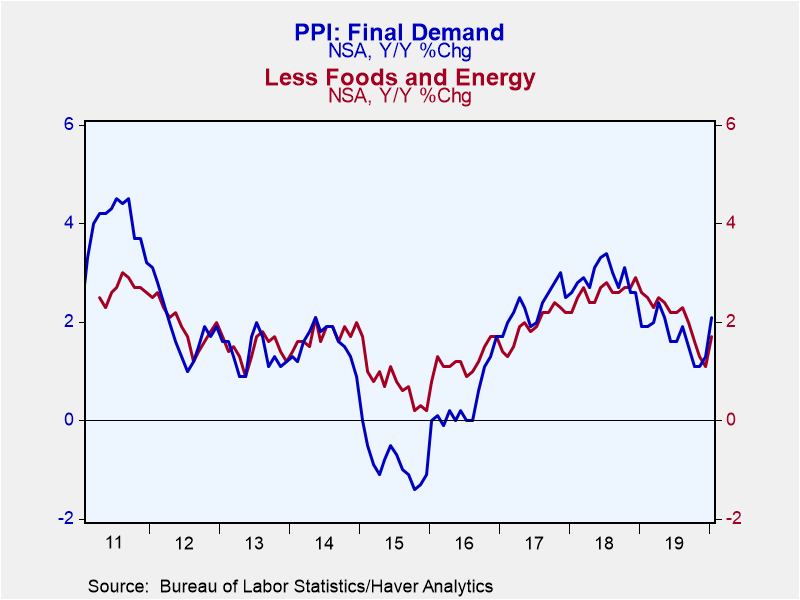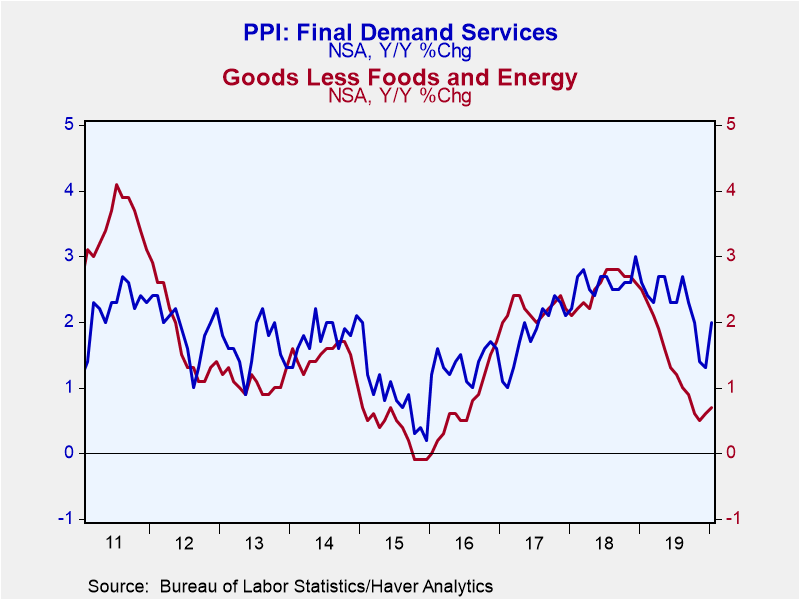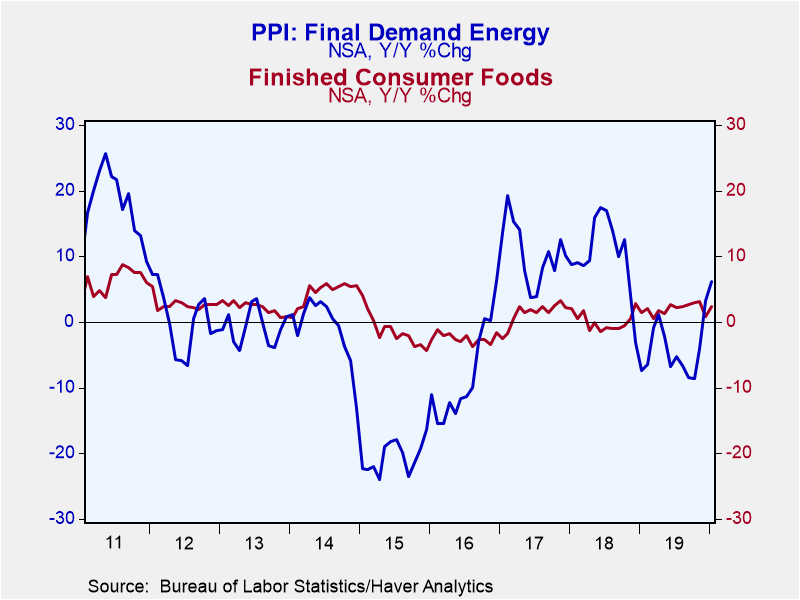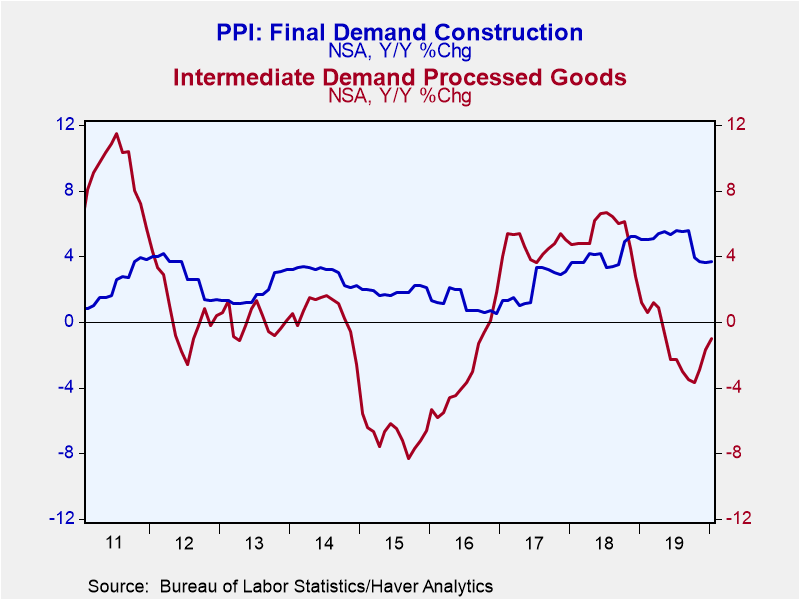 Global| Feb 19 2020
Global| Feb 19 2020U.S. Producer Price Index & Core Price Index Strengthen
by:Tom Moeller
|in:Economy in Brief
Summary
The Producer Price Index for final demand increased 0.5% (2.1% y/y) during January following a 0.2% rise, revised from 0.1%. A 0.1% gain had been expected in the Action Economics Forecast Survey. Producer prices excluding food & [...]
The Producer Price Index for final demand increased 0.5% (2.1% y/y) during January following a 0.2% rise, revised from 0.1%. A 0.1% gain had been expected in the Action Economics Forecast Survey. Producer prices excluding food & energy strengthened 0.5% (1.7% y/y) following a 0.1% uptick. A 0.1% rise had been expected. The PPI excluding food, beverages and trade services, another measure of underlying price inflation, rose 0.4% (1.5% y/y) after a 0.2% December gain.
A 0.7% increase (2.0% y/y) in services prices for final demand provided the strength to last month's PPI gain. It was the largest rise since October 2018 and followed no change in December. Trade services prices surged 1.2% (2.0% y/y) after falling during the prior two months, as the cost of trade of finished goods rose 0.4%. A 1.6% decline in transportation & warehousing prices offset this increase, but excluding these, prices improved 0.6% (2.1% y/y) after holding steady over the prior four months.
Finished consumer goods prices less food & energy held steady (1.3% y/y) following a 0.1% uptick. Core nondurable goods prices edged 0.1% higher (1.9% y/y) and durable product prices eased 0.2% (+0.4% y/y). Private capital equipment prices rose 0.1% (1.1% y/y) for the third straight month.
Food prices rose 0.2% (2.7% y/y) following a 0.3% decline. Beef & veal prices slid 2.4% (-3.3% y/y), while dairy product prices eased 0.4% (+6.3% y/y). A 22.4% increase (21.4% y/y) in fresh & dried vegetable prices countered these declines.
Final demand energy prices fell 0.7% (+6.2% y/y) as gasoline prices were off 1.5% (+23.1% y/y), but home heating oil costs improved 1.3% (12.0% y/y). Electric power costs eased 0.8% (+1.0% y/y) and the cost of natural gas strengthened 1.6% (-1.0% y/y).
The cost of construction surged 0.8% (3.7% y/y) following two months of stability. Private construction prices strengthened 0.7% (3.6% y/y) and public construction costs improved 0.9% (3.8% y/y).
Intermediate product prices fell 0.3% (-1.0% y/y), but materials & component prices for manufacturing rose 0.3% (-2.6% y/y).
The PPI data can be found in Haver's USECON database. Further detail can be found in PPI and PPIR. The expectations figures are available in the AS1REPNA database.
Wringing the Overoptimism from FOMC Forecasts from the Federal Reserve Bank of San Francisco can be found here.
| Producer Price Index (SA, %) | Jan | Dec | Nov | Jan Y/Y | 2019 | 2018 | 2017 |
|---|---|---|---|---|---|---|---|
| Final Demand | 0.5 | 0.2 | -0.1 | 2.1 | 1.7 | 2.9 | 2.3 |
| Excluding Food & Energy | 0.5 | 0.1 | -0.2 | 1.7 | 2.1 | 2.6 | 1.9 |
| Excluding Food, Energy & Trade Services | 0.4 | 0.2 | -0.1 | 1.5 | 2.0 | 2.9 | 2.1 |
| Goods | 0.1 | 0.3 | 0.3 | 1.8 | 0.4 | 3.4 | 3.4 |
| Foods | 0.2 | -0.3 | 1.2 | 2.7 | 1.8 | 0.2 | 1.2 |
| Energy | -0.7 | 1.5 | 0.3 | 6.2 | -4.4 | 10.1 | 10.6 |
| Goods Excluding Food & Energy | 0.3 | 0.2 | 0.1 | 0.7 | 1.4 | 2.5 | 2.2 |
| Services | 0.7 | 0.0 | -0.3 | 2.0 | 2.2 | 2.6 | 1.8 |
| Trade Services | 1.2 | -0.3 | -0.6 | 2.0 | 2.5 | 1.8 | 1.5 |
| Construction | 0.8 | 0.0 | 0.0 | 3.7 | 4.9 | 4.1 | 2.2 |
| Intermediate Demand - Processed Goods | -0.3 | 0.1 | 0.1 | -1.0 | -1.4 | 5.4 | 4.7 |
Tom Moeller
AuthorMore in Author Profile »Prior to joining Haver Analytics in 2000, Mr. Moeller worked as the Economist at Chancellor Capital Management from 1985 to 1999. There, he developed comprehensive economic forecasts and interpreted economic data for equity and fixed income portfolio managers. Also at Chancellor, Mr. Moeller worked as an equity analyst and was responsible for researching and rating companies in the economically sensitive automobile and housing industries for investment in Chancellor’s equity portfolio. Prior to joining Chancellor, Mr. Moeller was an Economist at Citibank from 1979 to 1984. He also analyzed pricing behavior in the metals industry for the Council on Wage and Price Stability in Washington, D.C. In 1999, Mr. Moeller received the award for most accurate forecast from the Forecasters' Club of New York. From 1990 to 1992 he was President of the New York Association for Business Economists. Mr. Moeller earned an M.B.A. in Finance from Fordham University, where he graduated in 1987. He holds a Bachelor of Arts in Economics from George Washington University.
More Economy in Brief
 Global| Feb 05 2026
Global| Feb 05 2026Charts of the Week: Balanced Policy, Resilient Data and AI Narratives
by:Andrew Cates










